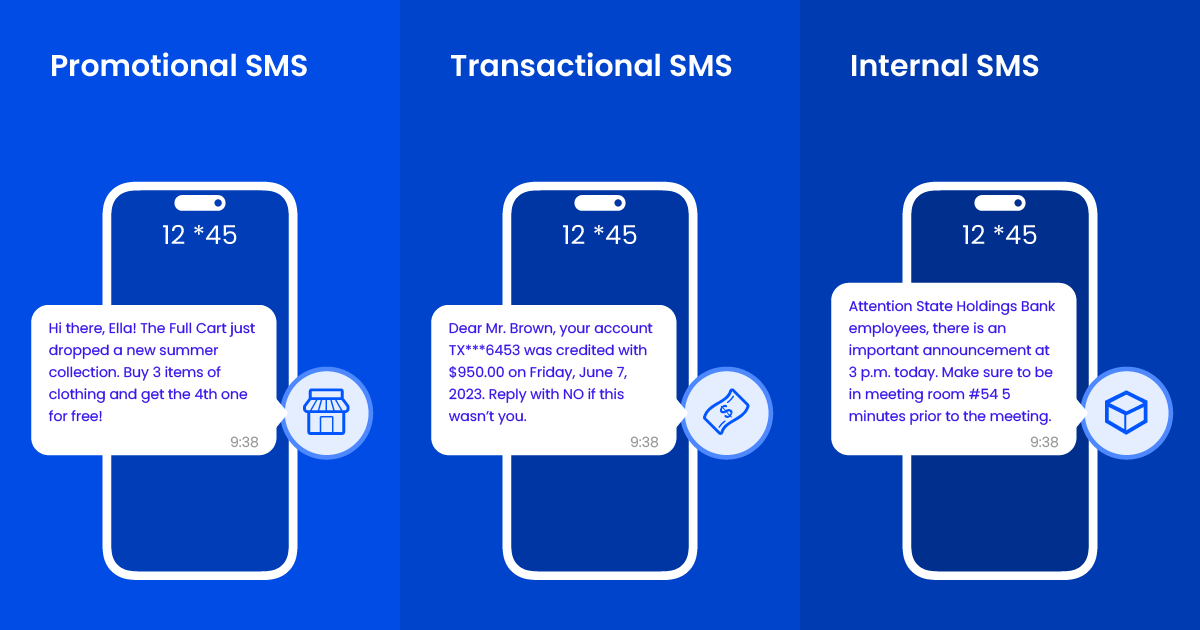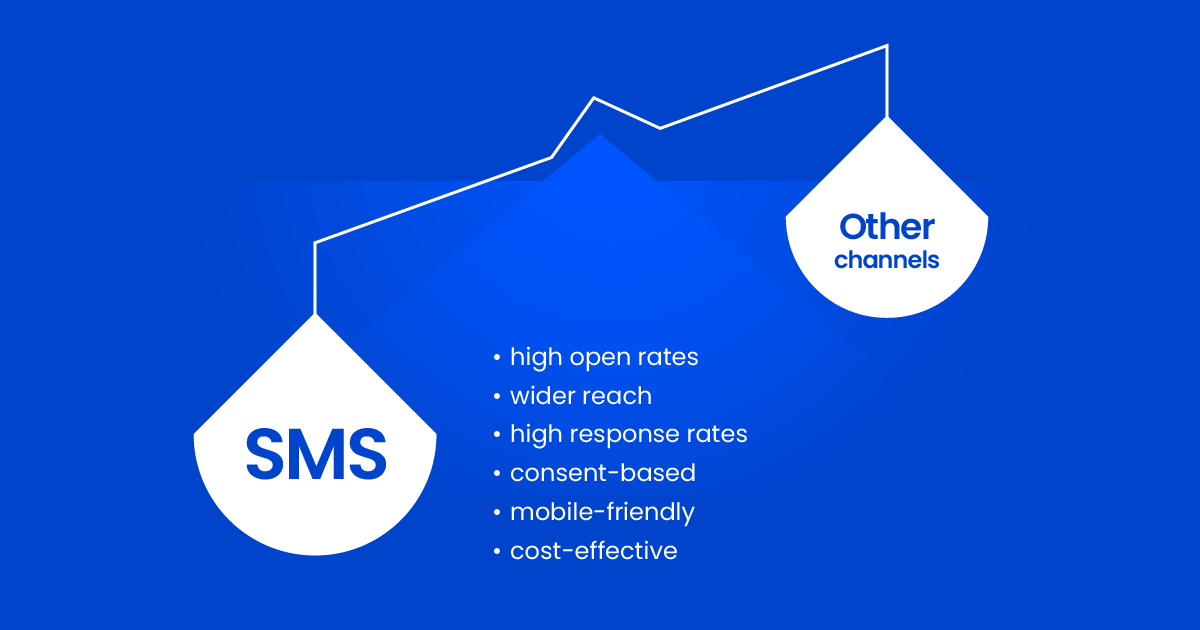Understanding SMS Communication Types and Their Business Benefits
Published: Jul 24, 2023

In a world that thrives on instant and flexible communication, businesses everywhere are adopting a tool that cuts through the noise and goes straight to the mobile phones of customers and employees.
Meet the Short Message Service, a versatile channel that’s transforming how companies and organizations communicate both internally and externally.
Whether it’s an urgent update, a personalized SMS marketing campaign, or any other form of business text, SMS messaging is a surefire way to get your message seen and heard.
But what is SMS communication and how can businesses benefit from it?
Let’s find out.
Understanding Text Message Communications
SMS communications fundamentally involve sending and receiving short text messages.
It is a popular way for businesses and individuals to share information instantly.
This ubiquitous technology works on the signaling channel of a mobile network and is compatible with all mobile devices.
When a text message goes out, it is transmitted from the sender’s device to the nearest network tower before traveling through the network infrastructure and making its way to the recipient’s mobile phone.
While SMS allows you to send messages of up to 160 characters, concatenation enables companies and organizations to send texts that are longer, although SMS best practices suggest keeping the message short and straightforward.
As a brand, you can choose to send messages in bulk or individually.
You also have the option to include anything from links to contact information.

Types of Business Messaging
SMS for business communications typically falls into two main categories: internal and external.
The latter can be divided into two separate types depending on the purpose of the message, which can either be transactional or promotional.
1. Transactional Messages
Transactional messages are those you send to customers following a transaction or business operation.
They are often triggered by certain activities, such as when a customer makes a payment or places an online order.
Other forms of transactional texts include account balance alerts, withdrawal notifications, and OTP verification.
They are meant to offer instant updates and time-sensitive information regarding transactions, account activity, and other forms of operational interactions with a business.
This helps in creating a seamless customer experience.
SMS Marketing Pricing
We use a pay-as-you-go pricing model, meaning we charge per sent message. No monthly or sign-up fees. SMS marketing costs vary depending on your destination.
2. Promotional Messages
As the name implies, promotional texts are meant to promote a product or a service.
They are marketing messages businesses send to their customers to let them know about sales, offers, new product releases, and upcoming events, just to name a few.
These messages are sent with the intention of generating leads, driving conversions, and boosting customer engagement.
Promotional communications usually involve adding call-to-action elements such as links where the recipient can redeem a discount or get more information.
3. Internal Messages
Also referred to as SMS employee communication, internal SMS involves using text messages for communication within a workplace.
It’s an easy way to share updates and other notifications among teams and departments.
As a manager or team leader, you can use SMS to send meeting reminders, project updates, shift schedules, employee surveys, and other important announcements.
Internal communication via SMS helps foster collaboration.
This is in addition to ensuring that employees are connected and well-informed, especially in situations where they may not have access to their email or an internet connection.

Advantages of SMS Over Other Communication Channels
1. High Open Rates
SMS text messages boast significantly high open rates.
In fact, studies have shown that most recipients read a text within five minutes after receiving it, which proves how reliable a communication channel SMS can be.
2. Cost-Effective
Compared to traditional methods like phone calls, SMS is a relatively cost-effective channel of communication.
This makes it ideal for businesses looking to reach out to customers or employees without breaking the bank.
3. Wide Reach
SMS messages can be sent to just about every mobile device that’s connected to a network.
This means businesses can reach a broad audience, including those who don't have access to WiFi.
4. Mobile-Friendly
The widespread use of mobile phones welcomes SMS into the daily lives of people.
5. Consent-Based
SMS messaging requires getting consent from recipients, often in the form of opt-ins.
Recipients who have opted in are more likely to engage with messages and be receptive to your communication efforts.

How SMS Can Be Useful for Internal Communications
Instant Updates
Business operations often depend on a timely and efficient exchange of information.
SMS communication facilitates that by allowing for instant and direct communication between employees and team members.
It ensures that employees receive crucial updates, reminders, or announcements as promptly as possible, boosting cooperation and responsiveness.
Remote Workforce Connectivity
Text messaging serves as an effective communication tool for businesses adopting a mobile or remote work policy.
A journalist attending a conference, for instance, probably can’t respond to an email on the spot.
Staying in touch via SMS, however, would be much more convenient in this case.
Urgent Notifications
Suppose there’s an emergency at the office, and you need all the employees to evacuate the building.
You obviously wouldn’t send an email to let them know about a fire in the hallway.
A work text message, on the other hand, can prove to be a crisis communication tool for urgent situations.
It enables you to immediately send critical alerts, evacuation notices, or safety instructions to employees, prompting an organized response and making sure everyone is safe.
Shift Scheduling and Announcements
SMS can come in handy for shift scheduling as well as other updates.
As a manager, you can send notifications to team members, reminding them about upcoming shifts or alerting them of any changes in the schedule.
This helps reduce confusion and keeps everyone in the loop.
You can also use SMS to inform employees about unexpected closures, such as due to extreme weather conditions.
Confidential and Secure Information
It goes without saying that security is key when it comes to internal business communication.
With the help of secure platforms or encryption technologies, text messaging can provide that confidentiality.
Employees can exchange sensitive information like passwords or access codes without having to worry about the risk of interception.
This guarantees that private internal communications remain confidential and protected.

How SMS Can Be Useful for External Communications
Instant Customer Engagement
SMS is the go-to channel for engaging with customers in a direct and immediate way.
Businesses can send tailored messages, news, promotions, and service announcements directly to the customer’s hands.
This ensures that the communication is not only timely but also reaches the right people—with the intention of prompting a quick response.
Efficient Customer Support
Text messaging comes in handy as an efficient way to carry out customer support interactions.
Customers can easily ask questions, raise concerns, or give feedback via SMS.
In turn, businesses can respond on the spot and provide solutions if necessary.
And if you need to send out a short survey to your target audience, SMS texting serves as a convenient way to do so; recipients can easily reply in a matter of seconds.
Timely Reminders and Notifications
Another area where SMS plays a pivotal role is sending timely notifications.
This can include appointment reminders, reservation confirmations, order delivery updates, and more.
Keeping customers in the loop helps prevent missed appointments and forgotten payments, in addition to enhancing customer satisfaction.
It also helps in streamlining business operations and minimizing logistical issues.
Targeted Marketing Campaigns
With high open rates and a vast user base, SMS texting is known for being a highly effective tool for mobile marketing.
It allows brands to send personalized offers, deals, and exclusive discounts to a target audience in an effort to promote their products or services.
By reaching out to customers directly, businesses can boost customer engagement and drive audiences down the sales funnel.
Two-Way Messaging
As a mobile messaging tool, SMS allows for two-way communication.
Companies and organizations can engage in meaningful dialogue with their customers. In their turn, customers can ask for help, provide their opinions, or make inquiries.
This helps build strong relationships between businesses and their audiences.
SMS can also be useful for interactive campaigns like polls and contests, allowing customers to easily participate and provide valuable insights.
